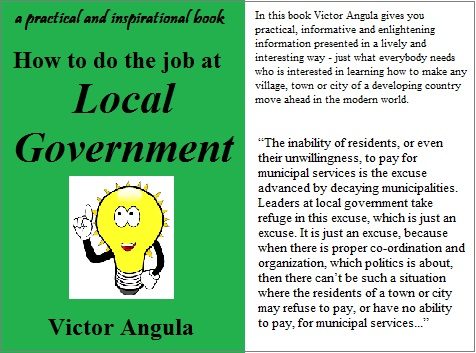
How to Do the Job at Local Government
by Victor Angula
Chapter 1
How to do the job
It’s public service
Every modern village, town, or city has a council. The council is the group of people elected to run or direct the affairs of the village, town, or city. Running or managing villages, towns and cities is what local government about. The villages, towns and cities have to be run so that they may grow and move forward. They also have to be managed so that they may develop and move in a sustainable and effective manner.
A town or city council is usually not a group of educated individuals, but a group of elected people. These are the leaders of the town, so that they have to be put in their positions through democratic and popular elections by the residents of the town or city.
Local government leaders can’t be hired or employed on account of their qualifications, skills and abilities. They have to be elected as a result of their individual quality, character, and desire to be public servants.
This means that public servants at the local level may actually be illiterate, uneducated, and ignorant – which is not a bad thing. Being uneducated or unqualified in any of the modern society’s disciplines is not a bad thing if the elected leaders have a strong desire to serve their towns. Being unskilled or lacking in abilities is not a handicap when the person has a burning desire to serve his or her people.
Since Independence Namibia was cursed with the situation of having people elected to local governments who knew nothing about local government, and they were not in the habit of learning. Not only did they not have the desire to learn anything applicable to their responsibilities they also didn’t have the attributes of leadership – the character and craving for public service.
Having people elected to public office who know nothing or not much about the functions of those offices is not where the problem has been; the problem has been as a result of the situation of people sitting in office while they lacked the attributes and qualities for public office. In other words, they simply did not have the spirit for public service.
The other problem was that this council business was generally viewed as a part-time job to supplement the income of some people who were entitled to a life of luxury although their political weight was not enough to elevate them to the central government level where the ruling elites had full access to the nation’s treasury and could line their pockets as much as they liked.
Thus local government was left to the political lightweights, those who had no potential at all to ascend to the top of the political pyramid. They run the towns to the ground because they believed the ruling party to which they belonged gave them such entitlements as a supplementary income through the local government structure. They were not much different in their belief of this entitlement than the senior citizens were of their monthly pension grants.
But a real councillor is a public servant. The councillor is not a servant of those at central government, but a servant of the people who elected him or her to the village or town council.
Although, of course, it’s not exactly direct democracy since the people have to vote for a party and in turn the party appoints individuals to represent the people on its behalf on the council, so that at times these individuals may be unsure of which to represent – the people or the party.
Nevertheless it’s the people who have to be represented or to be served by the elected public servant. In the African situation this servant is tasked with two major responsibilities: to run the public affairs of the village, town or city, and then bring about development.
Development means villages have to grow into towns, while towns grow into cities; and a city grows into a metropolis. It’s both the growth of physical structures, such as bricks and mortar houses, roads, communication infrastructures, the creation of modern ablution facilities, sewerage systems, a functioning and effective healthcare and education infrastructure, as well as the economic growth in the form of businesses that create sustainable jobs.
The worst thing that can happen is for the people to be unemployed, be underemployed or to be subsistence farmers forever. Without employment a town cannot be built and a modern country cannot take shape.
If employment can somehow be created by the efforts of a politician, this can only happen at the local level. It’s not the head of state that can create jobs. The president can do absolutely nothing, no matter how much he or she could try, to create jobs for the people.
All the president can do to create jobs for people is to add more faces to the State House staff and to add more boots to the armed forces. It’s the mayor who can do something practical to get the people in his or her town productive. It’s the councillors, not the central government ministers, who can do something about unemployment.
And they do it by going out of the way to sit down with entrepreneurs and the business people of the town to see how more people could get their names on payrolls. They do it by going around at work places of institutions to ascertain that people who have recently retired were replaced with young people.
They do it by going to bank managers and sit them down and engage them in conversations to try making them believe in the potential of the youth so that instead of just tying up society’s money in the safety of banks the money should actually be invested in youth enterprises for the benefit of economic growth.
They do it by constantly monitoring the performance of enterprises owned by the youth, motivating them to keep the focus and follow their dreams instead of taking shortcuts to a flashy lifestyle at the expense of business growth. Employment is created by business people who are working in rapport with local leaders.
Thus the job at local government is the job of public service. It’s about providing the services which no school or training institution may teach. It’s the job of leadership.
You don’t have to be an expert at anything or qualified in anything. What you must have is the desire to organise, motivate and inspire people to move forward as a community. Nobody must be left behind. If people have come together in a village or town or city to make a single community it’s because nobody wants to be left behind.
Nobody wants to be left in the bush. Nobody must be left behind in the ghetto. Nobody must be left behind in underdevelopment. Everyone must be a part of a community which is moving ahead in the modern world.
Which means you have to be at the service of the people, particularly the people who seem to be left behind or unable to catch up. You are their servant.
(This book will be serialised. Don’t miss the next episode next week.)







